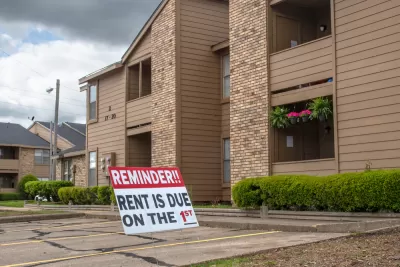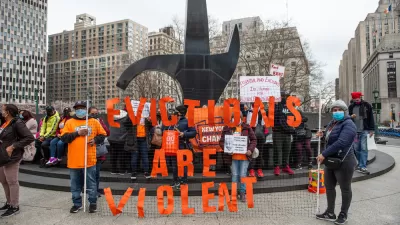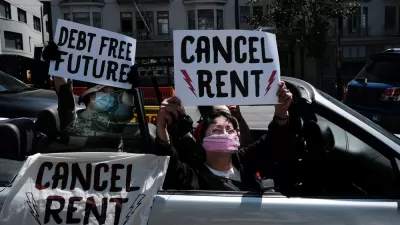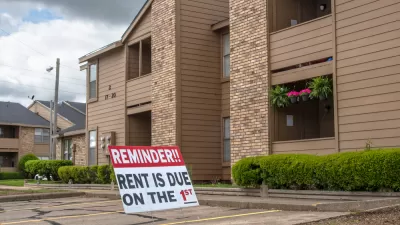A pair of recent surveys attempt to shed light on the changing business and property management practices of landlords during the pandemic.

An article by Elizabeth Kneebone and Chris Herbert examines the uncertain surrounding the rental housing market, for both renters and landlords.
Here's how the two writers describe the uncertainty surrounding the intersecting economic hardships of these two groups:
While there is significant concern about whether these distressed renters will be able to stay stably housed, missed rental payments also have implications for the nation’s landlords. But much less is known about how property owners have fared and how they have responded to this significant shortfall in rent collections.
Enter a space of recent national surveys, which have provided information on the changing economic condition and business practices for rental property owners. Planetizen shared an article about the first survey, published by the Joint Center for Housing Studies of Harvard University, earlier in September. The second was published by the Terner Center for Housing Innovation at UC Berkeley and picked up by Planetizen in July.
Fast forward to a new study, "The Impact of the Pandemic on Landlords: Evidence from Two National Surveys"—published as part of the Housing Crisis Research Collaborative and written by Kneebone and Herbert along with Nathaniel Decker and Elijah de la Campa—which synthesizes the findings of the two previous studies.
"While distinct in certain respects, the two studies were coordinated to facilitate a comparison of results. Both surveys were designed to explore the pandemic’s impact across different types of landlords, properties, and rental markets by asking owners a series of questions about rental collection, profitability, and management practices, both pre- and post-pandemic," explain Kneebone and Herbert.
Despite their differences, the two surveys report consistent findings.
- "Roughly a third of landlords reported declines in rent collection during the pandemic, although smaller-scale landlords reported more substantial losses"
- "[L]andlords were more likely to grant concessions to tenants, defer maintenance, and reduce payments for debt and other expenses during the pandemic compared to a year earlier"
- "[B]oth studies found that only a relatively small share of landlords indicated they were likely to pursue evictions of tenants behind on rent."
- "Both surveys find that the financial stress from the pandemic has increased owners’ interest in selling their properties."
The source article provides a few more similarities between the survey findings as well as reporting a few subtle differences between the two.
FULL STORY: FINDINGS AND LESSONS FROM TWO NATIONAL SURVEYS OF LANDLORDS

Alabama: Trump Terminates Settlements for Black Communities Harmed By Raw Sewage
Trump deemed the landmark civil rights agreement “illegal DEI and environmental justice policy.”

Study: Maui’s Plan to Convert Vacation Rentals to Long-Term Housing Could Cause Nearly $1 Billion Economic Loss
The plan would reduce visitor accommodation by 25% resulting in 1,900 jobs lost.

Planetizen Federal Action Tracker
A weekly monitor of how Trump’s orders and actions are impacting planners and planning in America.

Wind Energy on the Rise Despite Federal Policy Reversal
The Trump administration is revoking federal support for renewable energy, but demand for new projects continues unabated.

Passengers Flock to Caltrain After Electrification
The new electric trains are running faster and more reliably, leading to strong ridership growth on the Bay Area rail system.

Texas Churches Rally Behind ‘Yes in God’s Back Yard’ Legislation
Religious leaders want the state to reduce zoning regulations to streamline leasing church-owned land to housing developers.
Urban Design for Planners 1: Software Tools
This six-course series explores essential urban design concepts using open source software and equips planners with the tools they need to participate fully in the urban design process.
Planning for Universal Design
Learn the tools for implementing Universal Design in planning regulations.
Caltrans
Smith Gee Studio
Institute for Housing and Urban Development Studies (IHS)
City of Grandview
Harvard GSD Executive Education
Toledo-Lucas County Plan Commissions
Salt Lake City
NYU Wagner Graduate School of Public Service





























